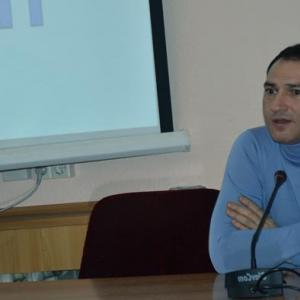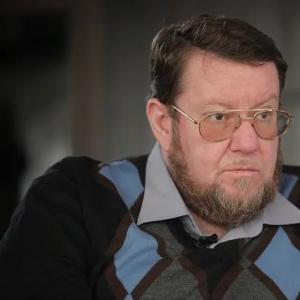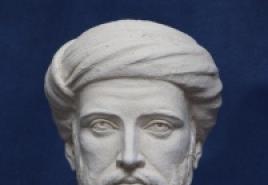Evgeny Satanovsky (12/13/2018) From two to five. Evgeny Satanovsky – latest videos of Evgeny Satanovsky now
The future orientalist and analyst was born on June 15, 1959 in the capital of the USSR. His father was a famous engineer. At one time, he put forward the idea of continuous casting of steel, which is widely used in industry. Mother Eugene is a linguist by education.
Eugene grew up as a sickly child. For this reason, he often missed school classes. However, the ability allowed him to study perfectly. He externally passed the exams for the fourth grade and immediately entered the sixth.
The boy spent a lot of time reading. He was especially interested in ethnography and history. Satanovsky planned to study at Moscow State University, but his fate turned out differently: he entered the Institute of Steel and Alloys, continuing the family tradition.
Having become a student, Eugene easily mastered the educational material and managed to actively participate in the public life of the institute. He even led a student squad that helped the police fight offenders on the streets. In this, Satanovsky was helped by classes in the karate section.
Passing an industrial practice, Eugene visited many parts of the country, learned how metallurgical production was established locally. After graduating from high school, Satanovsky works at the state institute for the design of metallurgical plants. His father and brother also worked there.
The death of my father changed everything. The salary of a young specialist was not enough to live on. Satanovsky goes to work in the hot shop of the Hammer and Sickle plant. For four years of physical work, Eugene has grown stronger physically and mentally. Life experience subsequently allowed him to create his own metallurgical enterprise and gain financial independence. Now Satanovsky got the opportunity to come to grips with science, which he had long dreamed of.
Evgeny Satanovsky: career as a scientist and analyst
In the early 90s, Yevgeny Yanovich decides to create an institute that would study Israel. For a long time, Satanovsky selected specialists in oriental studies, political scientists and analysts. Subsequently, the center created by Evgeny was renamed the Institute of the Middle East. Since 1993, Satanovsky has become the full head of this scientific association.
A few years later, Satanovsky defended his dissertation work in economics and became a candidate of science. After that, Yevgeny Yanovich headed the Russian Jewish Congress for some time, where before that he was in charge of culture, charity, sports and education.
At the same time, Satanovsky lectured at Moscow State University, MGIMO and at the Moscow Hebrew University on the economics and geopolitics of the Middle East.
Having become an experienced political scientist and analyst, Satanovsky receives invitations to various scientific conferences as an expert and speaker. Satanovsky, in alliance with Sergei Korneevsky, broadcasts the program “From Two to Five” on the Vesti FM radio. Yevgeny Yanovich is regularly invited to participate in television shows, where he authoritatively sets out his position on events taking place in the Middle East.
Yevgeny Yanovich has been married for more than thirty years. His wife's name is Maria. Satanovsky has a son and a daughter, as well as three grandchildren.
Listen, man invented human rights for himself. If you try to understand, but generally speaking, what is it about? Does anyone follow them? Theoretically, in fact, very nice. In theory. But in practice?
Well, here you have, of course, the Convention against Torture. Fine. You have the Convention against Torture. Amazing. And now you have criminals - for example, your criminals are the Tsapok gang. This is an example that is already with me and will die! To such an extent, it is obvious. You have not only torture there - you have a child burned alive there. Nothing. Has anyone interfered with this? Has anyone, generally speaking, from our leadership, from Western human rights activists, raised their voice in defense of ordinary people? Someone said: "Guys, come on, you will do whatever you want so that this never happens!". Exemplary - indicative - but at least you will burn them alive at the stake, as in the Middle Ages. Lies is all that it doesn't help. Helps-helps. If there is no punishment, this, of course, helps criminals.
Well, the legislation is not ours, the world's - it is for criminals! Lawyers try to cover them up, anything can be done with them - it's like with Al Capone. Yes, you "kill" any number of people, it doesn't matter: at best, you will be imprisoned for non-payment of taxes, because non-payment of taxes is, yes, here the system will turn on. And the murder... But who cares about all these people, and who else did you kill?! Yes, if you, of course, are against the president, well, maybe you will sit in the electric chair, but maybe, by the way, you won’t! The killer will remove you before that, so that no ends can be found at all. Do you remember such a topic - Socialist-Revolutionaries, Socialist-Revolutionaries? That's what they came up with.
When it comes to issues of politics and the economy of Israel, the name of Yevgeny Yanovich Satanovsky immediately comes to mind. He devoted himself to the study of oriental studies, received a Ph.D. in economics. Yevgeny Yanovich's speeches are full of irrefutable facts, and interviews attract attention with well-aimed statements.
Childhood and youth
The future scientist was born in the summer, June 15, 1959, in the capital of the USSR. The boy's parents are Jewish. Evgeny's father, Yan Efimovich, is a famous metal design engineer, known for his developments in the field of metallurgy. Mother Alexandra Lvovna knew foreign languages, but left her career for the sake of her family. Before the appearance of little Zhenya, the Satanovskys were already raising their first child, Victor.
Young Yevgeny Satanovsky with his brother
Yevgeny Yanovich grew up as a sickly boy and missed school classes due to a cold. But the omissions did not affect performance in any way. After the fourth year of study, he passed the exams in advance and went directly to the sixth grade. The young man read many books, studied history and ethnography, wanted to enter Moscow State University and become an archaeologist.
But in the end he continued the tradition of the family and went to the Institute of Steel and Alloys. Eugene was a brilliant student, he easily learned new subjects. At the same time, he took up social work and became interested in karate. Practice from the institute allowed the young man to travel a lot and travel around half the country.
Career
Leaving the walls of the educational institution, Evgeny Satanovsky went to earn money with his father and brother. The salary was tiny, but there was an opportunity for career growth. In 1982 I went to a Hebrew study group. Changes occurred when, in 1984, the young man's beloved father suddenly passed away. At that moment, a new round began in Yevgeny's life biography.

There was little money, and in order to live, the young man went to work in the workshop of the Hammer and Sickle plant. Yevgeny Yanovich worked there for four years. Having earned the required amount, he founded his own business - the Ariel metallurgical company. Having gained financial independence, Eugene plunged into science.
In the early nineties, due to the beginning of changes in the country, Evgeny had the idea of creating the Israel Institute. For two years he gathered scholars-experts in Orientalism. The idea succeeded. Later, the research center became the Institute of the Middle East. Yevgeny Yanovich himself has been the permanent director of the Institute since 1993.

In 1996 Evgeny Yanovich became a member of the Russian Jewish Congress. For three years - from 2001 to 2004 - he was the head of the Congress. Then he again plunged headlong into science, but remained as part of the directors. In 1999 he defended the degree of candidate of economic sciences.
Yevgeny Satanovsky can be found at the Department of Jewish Studies at the Institute of Asian and African Countries at Moscow State University. There, the scientist teaches geopolitics and economics of the Middle East region. Conducted teaching activities at MGIMO.

Yevgeny Yanovich is the Deputy Head for the Teaching of Jewish Civilization at the Hebrew University in Jerusalem.
Satanovsky is a member of the council of the Russian Society for Friendship with Arab Countries. He is a member of the editorial boards of the journals "Diaspora", "Bulletin of the Jewish University" and "Oriental Collection", the academic council of the Library of Judaica.

The candidate of sciences actively participates in scientific conferences, appears in television and radio programs, and together with Sergey Korneevsky leads the program “From two to five”. Yevgeny Yanovich Satanovsky is known for allegations that the September 11 attacks in the United States and Nord-Ost were organized by none other than the Saudi prince Turki ibn Faisal Al Saud.
Personal life
In his personal life, Eugene has been happily married for a long time. The life partner of Yevgeny Yanovich is called Maria. She gave birth to two children - a daughter and a son. Eugene himself does not cease to assure that the family is the most important thing in a man's life.
Satanovskie - happy parents and grandparents. The children gave their parents three grandchildren. Yevgeny Yanovich carefully hides the details of his private life; there are no joint pictures of a man and his wife on the Web.

He is friends with Vladimir Solovyov. He gave Yevgeny Yanovich the nickname "Armageddonich". The sonorous surname of Satanovsky does not refer to the biblical motif. The surname comes from the name of the city of Satanov, which is located in Ukraine.
According to Evgeny's acquaintances, Satanovsky is a kind and disinterested person. About himself, the man says that he is too compassionate. Calls himself a Russian Jew.
Evgeny Satanovsky now
Now Satanovsky is the author of books and scientific and political articles. In his writings, the author focuses on the geopolitical structure of the planet and the role of the Eastern countries in this matter. The book "If I were a Russian Tsar" is built on advice to the president. The publication “Would you go…” offers new visions of the idea of the Russian Federation. The composition "The Cauldron of Troubles" reveals the foreign political relations of the Russian state with the countries of the East.

In 2017, the Eksmo book publishing house released two works by Satanovsky at once. The first - "Notebooks of a Fool" - tells about the events taking place in the world and in the country. The second - "Dialogues" - is focused on topical issues of peace politics. Co-written with .
Evgeny Satanovsky often appears in news feeds. So, on March 20, 2018, an expert’s statement appeared on the Economics Today information portal that the United States is afraid of an open conflict with Russia, because they know what weapons the Russian country has in its hands.
Projects
Books
- 1999 - "Israeli Economy in the 90s"
- 2001 - "Israel in modern world politics: probable strategic adversaries and strategic partners"
- 2012 – “Russia and the Middle East. Trouble Cauldron"
- 2012 - “If I were a Russian Tsar. Advice to the President"
- 2013 – “My life among the Jews. Notes of a former underground worker"
- 2014 - "Would you go ... Notes on the national idea"
- 2015 – The Book of Israel. Travel notes about the country of saints, paratroopers and terrorists
- 2015 - "Once upon a time there was a people ... A guide to surviving the genocide"
- 2016 - Cauldron with Troubles. Middle East for Dummies»
- 2017 - Dialogues
Articles
- 2001 - "Globalization of terrorism and its consequences"
- 2006 - "Great Game - XXI century"
- 2005 – New Middle East. Russia and the Muslim World"
- 2008 - "A world on the ruins of what will remain ..?"
- 2008 - "Five Years of War for Oil and Democracy"
- 2015 - “Fighting on a patchwork quilt. The future of the Arab world will be determined by events in Yemen.”
Collections
- 1998 - “Actual problems of the Middle East. Conference materials»
Director of the Middle East Institute Yevgeny Satanovsky - latest videos on VestiFM and other political programs. From two to five with Sergei Korneevsky, full contact with Vladimir Solovyov and the Sunday Evening political show.
Evgeny Satanovsky in the program "From 2 to 5" today 08-05-2019
Yevgeny Yanovich began today's release of the program with the announcement of a new schedule for the release of programs from Monday to Friday. How Nikita Khrushchev gave Crimea to Ukraine and what caused it.
Evgeny Satanovsky in the program of Vladimir Solovyov "Evening" 28-02-2019 The conflict between India and Pakistan
Elections are scheduled in India in the near future. Therefore, the conflict with Pakistan will continue in a sluggish mode until May. Who else benefits from a war between the two countries and how it will affect the international situation.
Evgeny Satanovsky in the program from 2 to 5 18-09-2018
The latest program of Yevgeny Satanovsky discusses the provocation of Israeli pilots, which resulted in the death of a Russian aircraft with 15 soldiers on board. Who is to blame, and how Russia will respond.
Solovyov: - Evgeny Satanovsky is sick on 09/05/2018
On today's broadcast of the Full Contact program, Vladimir Solovyov announced the illness of Yevgeny Yanovich Satanovsky. The political scientist and host of the program "From 2 to 5" is being treated and humorously comments on his illness.
Evgeny Satanovsky - From two to five 26-07-2018
- Oil - we are on the same side with OPEC
- BRICS summit kicks off in South Africa
- Mikhail Khodarenok - the hour of the militarist
Satanovsky - From two to five 10-07-2018
In the next issue of the program From two to five, Evgeny Yanovich Sataeovsky and Sergey Korneevsky discussed the main events in Russia and world politics. The World Cup forced Satanovsky to watch the game of the Russian team.
Evgeny Satanovsky - from 2 to 5 04/25/2018
In the latest issue of the program "From two to five" on radio Vesti-FM, Evgeny Yanovich and Sergey Korneevsky discussed: the situation in the Middle East; how Rospotrebnadzor takes care of the well-being of Russians; US role in Syria; Crimean food.
Evgeny Yanovich Satanovsky in the Full Contact program 12-04-2018
Evgeny Satanovsky and Vladimir Solovyov discussed the main events of recent days in the Full Contact program on Vesti-FM. Is a Trump strike on Syria possible? what to do with the Russian economy; international review.
Evgeny Satanovsky - from two to five 11-04-2018. Trump prepares to hit
The main topic of today's program from 2 to 5 was Donald Trump's threat to strike at Syria. The extent to which the US Army is capable of entering into an open confrontation with Russia is being discussed by Yevgeny Satanovsky and Sergey Korneevsky.
Evgeny Satanovsky and Vladimir Solovyov - Full Contact 05-04-2018
On the last broadcast on Vesti-FM, Evgeny Satanovsky and Vladimir Solovyov discussed the 7th Moscow Conference on International Security. Russia has gathered on one platform the highest military personnel from 95 countries of the world.
Satanovsky - from two to five 02/27/2018
In today's edition of Evgeny Yanovich Satanovsky's program "From two to five" on Vesti-FM radio: the situation in Syria and throughout the Middle East; economic situation in Russia; election race for the presidency.
Part 1 The US lost in Syria, but continues to spoil
Part 2 Russia and USA
Part 3 Blockchain
Satanovsky - from two to five 22-02-2018
Today's episode of Satanovsky's From Two to Five discusses:
- bomb "Drill" - cheap and very angry;
- not everything is so bad in our oil industry;
- imitation of violent US activity
From two to five 15-02-2018
Today's edition of Yevgeny Satanovsky and Sergey Korneevsky's program from 2 to 5 discusses the main political news in Russia and the world. The program airs on VestiFM radio on Tuesday, Wednesday and Thursday.
Part 1 Irresponsibility is ours, dear!
Part 2 Problems and achievements of modern China
Part 3 The Hour of the Militarist - Mikhail Khodarenok
Satanovsky - from two to five 14-02-2018
Evgeny Yanovich Satanovsky devoted today's issue of the program "From 2 to 5" to an overview of the current situation in Europe, the military-political situation in Syria and the Russian economy. How much France today differs from the good old France familiar to everyone. Watch Satanovsky's program at youtube.
- France today and yesterday
- The situation in Syria
- Economic transformations and business problems in Russia
Update program "From two to five" regularly, come
Evgeny Satanovsky and Vladimir Solovyov about Navalny
Director of the Middle East Institute Yevgeny Satanovsky in Vladimir Solovyov's Full Contact program spoke about the latest events in Yemen, Saudi Arabia and discussed with the host Alisher Usmanov's answer to Alexei Navalny, in which the businessman gave an answer about his activities and the reasons why Navalny decided to slander him .
The program used an audio recording of Alisher Usmanov's speech. The businessman filed a lawsuit for libel against Alexei Navalny, and a court hearing will take place soon, which will give a legal assessment of the actions of the "opposition" politician Navalny.
Update regularly, come back
In Israel, it's completely different. At the same time, the environment, to put it mildly, does not like Israel very much, sometimes flirting with it, sometimes depending on it, and sometimes directly, though not openly, like Egypt today, being its ally. Or an adversary - like the same today's Turkey, Qatar and many others. Iran is a separate issue. They honestly say: guys, we will destroy you. Israel believes in the seriousness of Iran and looks at it with interest on this occasion. So there is some kind of policy.
Yakov Kedmi: Kissinger's expression is true of many other states as well. In a large empire, especially when the form of power there is more authoritarian, it is possible to define foreign policy separately from domestic. For example, in China, foreign policy does not depend on domestic policy, just like in Russia. Imperial interests are completely different. And in a small state, especially one like Israel, which is in such a difficult situation, everything that happens inside will affect foreign policy - every step of it. Our foreign policy has always been not in itself, but as a derivative of our Arab-Israeli or Palestinian-Israeli conflicts. And this is an internal problem. And since most political parties have built themselves over the past 30 years precisely on their attitude towards the Arab-Israeli conflict, it is clear that everything that happens with this conflict concerns these parties, and all our other foreign policy relations also depend on this conflict. Our relations with Europe, our relations with the United States, our relations with the Muslim world are all derivative. And all this is tied to our internal party platforms, each of which is trying to propose a solution or non-solution of this issue, if it is solvable at all.
The Palestinian-Israeli conflict had several stages. The first stage is before the establishment of the State of Israel. The second stage is after the creation of the state and before the Six Day War. The third stage is after the Yom Kippur War. And the last stage - after the arrival of a million Jews from the Soviet Union. Why is this the last stage? The fact is that, according to Yitzhak Rabin, as soon as the repatriation from the Soviet Union began, the entire Arab world, especially the Palestinians, reconsidered their attitude towards Israel, telling themselves that now Israel is a reality that they will never be able to cope with. That is, the information that Israel has nuclear weapons led all Arab countries to the idea that it is impossible to eliminate Israel by military means. But the arrival of a million Jews from the Soviet Union led them to understand that this problem could not be solved in any way. The country - in their understanding - has passed a critical mass in terms of quantity and quality of the Jewish population. Yitzhak Rabin based his conclusions on what kind of reports all sorts of intelligence agencies put on his desk. It is clear that it was difficult for a less knowledgeable person to determine how much and what impression the repatriation made on the entire Arab world, including Palestine. But the fact is that there is nothing that could refute Rabin's words, and everything that happened next only confirms them.
Before the Yom Kippur War, when I first joined the Israeli army, there was a concept that there was no Palestinian problem. Golda Meir said: “There is no such people as the Palestinians. I am Palestinian." Then the concept changed, and the country's leadership recognized the existence of the problem. But the Arab countries have ceased to be interested in and use the Palestinian problem. The Egyptians were the first to do this, especially after 1979, when the peace agreements were signed. And everyone else followed suit. Today, the Palestinian problem in the eyes of the Arab world exists more or less in the definition that Saudi Arabia gave in early 2001 (on its own initiative, we note): “Palestinian problem? Adjust it how you want! And then there will be no problems between the Muslim world and you.” That is, in fact, they said: “We are ready to recognize Israel, we are ready to establish diplomatic relations, we are ready to see Israel as one of the countries of the region. With an open heart or not, it doesn't matter. But we are ready for this, we recognize your country and are ready to recognize it, including formally. The only thing is to fix this problem. We don't even tell you how, it's up to you." In other words, the Palestinian-Israeli conflict has already turned from a problem, in our understanding, artificially created by the Arab countries, into a problem strictly between us and the Palestinians. We were left alone with them, as it was before. The Arab world is now only a background, not the cause of this conflict, and the participation of the Arab world in it is not decisive. The agreements with Egypt showed this well: the Egyptians signed their papers regardless of what happens between Jews and Palestinians. So did Jordan. And Syria was ready to do the same. That is, the fact that Israel did not have agreements with Syria is not because of the Palestinians. This issue was not on the agenda at all.
Today, only a small handful of fringe politicians remain in Israel who say that the Palestinian people do not exist. And you, you can ask them, sorry, who? How will you determine which people are and which are not? The Palestinian people was formed in 1921, and the British created it. Prior to this, there really were no such people. Why? Yes, because Palestine was part of the Ottoman Empire, and most of the Arabs of Palestine believed that they belonged to the vilayet where the ruler was located. And the ruler was sitting in Damascus. That's when they cut off Damascus, and cut it off harshly, and if not with the enemy, then with the rival, the French, and the British created a separate political unit not connected with Damascus, then people said: “Since we are left here on our own, Damascus we don’t, and we have never been in Egypt, then we will be Palestinians.” And they became Palestinians.
Evgeny Satanovsky: At the same time, the presence of the people and the presence of the state do not necessarily coincide. On this planet, there are a lot of peoples who do not have states, and much more significant in terms of numbers than the Palestinians.
Yakov Kedmi: Yes, and in the same way there are states that several nations consider their own. That is, there is no absolute rule. Interestingly, the economic elite of Palestine (which the British strengthened in every possible way) were Christians, not Muslims, and only demographic processes created the situation that we see today.
Evgeny Satanovsky: And they radically changed it compared to what it was at the beginning of the 20th century. Actually, even in our memory in Ramallah or Bethlehem, the Christian population prevailed - as in all European colonies in the Middle East.
Yakov Kedmi: The same thing happened in Lebanon and Syria. European colonial power was based on national and religious minorities. Therefore, the British supported Jews and Arab Christians as a minority that strengthened their power. They were guided by the principle of "divide and conquer". The French did the same, who even went so far as to create a separate state for the Maronites, adding to them a little Druze, a little Shia and a little Sunni for order. This is how Lebanon appeared, which was part of Syria and which is in a state of continuous decay. If, God forbid, Syria collapses, Lebanon will collapse as well.
The Palestinian nation began to take shape precisely then, in the 20s of the XX century. At the same time, the concept of "Nagba" appeared - which, so to speak, was "adopted" by other people in 1948 and later. "Nagba" means "tragedy, catastrophe". So, the tragedy was that power in Palestine passed to the infidels - from Muslims, from Turkey, to the British, Christians. For the local population, this was the biggest shock. They have always been under Muslim rule since the 6th century. Nobody remembers the Crusaders anymore. And suddenly, after more than a thousand years, everything collapsed - all the foundations of the world. Christians came and began to restore their order! And then the Jews appeared, who were more perceived as accomplices of the British. When problems between Jews and Arabs began later, the first clashes were not on national grounds, but on practical grounds. There was a law in the Ottoman Empire: when you sell land, you do not have the right to drive peasants off this land. They keep working on it. But when the Jewish colonists started buying land from the Arab Effendi, they told the peasants: “Stop, we are for Jewish labor. Leave." Those, of course, were indignant: “What are you? This has never happened before! Law in the State! You have no right to drive us away!” But the Jews had money, they gave the Turkish official baksheesh - a bribe - and he turned a blind eye to what was happening. But the Arabs did not want to leave, they have been sitting on this land for a thousand years. That is, the first Jewish colonists had to literally drive people from their land - because they bought this land.







